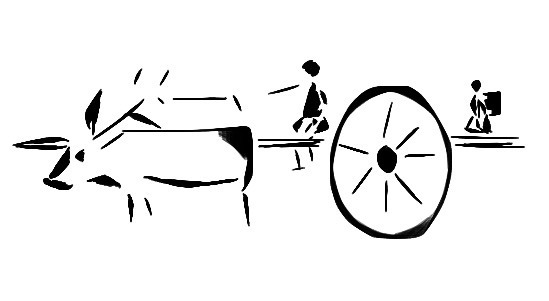Our school, Kendriya Vidyalaya No. 2, was surrounded by a canopy of trees in the Survey of India Campus, Uppal. It was about three and a half kilometres from my home at Ramanthapur. Every day, we used to walk with a heavy school bag to the bus stop, which was half a kilometre from our place. Very few children were fortunate as their parents dropped them at the school. Travelling by a shared van or an auto-rickshaw was a luxury. We depended on the Road Transportation Corporation bus for attending the school.
Very few buses plied from Koti and Charminar to Uppal. There were hardly any buses during the school travel hours between 8 am and 8:30 am and between 3:30 pm and 4:30 pm. Even if a bus arrives, the passengers were packed like sardines, we used to get in squeezed or travel by footboard. It was risky and inconvenient but had to endure the ordeal.
Most of the buses tilted towards the left. This is blamed on more number of passengers including women travelling on the footboard. The imbalance in weight of the bus caused the shock absorbers on the left to go crazy!
During that time, I found that a train of bullock carts moving from Chaderghat to Uppal. All along the banks of the Musi, the farmers cultivated Para grass, irrigated by the sewage water. The fresh grass from these fields was favoured by dairy farm owners in Hyderabad for a good yield of milk. The cut grass was taken for selling at Chadarghat by the evenings, and the empty bullock carts would return back to Uppal in the mornings.
One day all the buses were full and there was no room. I saw these bullock carts moving towards Uppal. Then I and my younger sister followed one of them, placed our school bags on it and walked along with it. The man riding the bullock cart told us not to follow him instead catch a bus. After travelling some distance, he understood our plight and signalled us to hop onto the cart. We became friends and chatted all the way to our stop. It became a routine as the man used to pass the route at the same time. If we missed the bus, just got on the bullock cart and went to school. Once we were halfway through the distance, a bus was approaching us with few passengers. Understanding my predicament, my friend parked the bullock cart in the middle of the road stopping the bus and then told me to get into it. Going to school had always been a great experience especially on the bullock cart.
Later in my life whenever I had an opportunity, I used to get on the bullock cart. The most enjoyable ride was when my cousin got married. He went to a bride’s home in a chain of bullock carts after the wedding ceremony. My dream was to get married in a similar manner. Keeping it in mind, I had chosen a beautiful image of a bullock cart procession for the wedding card. Unfortunately, it remained a pipe-dream.
While returning from school we faced the same transportation problem. We used to come out through the small gate to catch a bus at Ampro Biscuit Factory. As usual, the buses were full, rarely stopped or stopped far away so that some of the passengers can only alight from the bus. Some of the students hated the buses so much that they used to throw stones at them.
There used to be a row of old and beautiful Ficus trees near the bus stop. Some of us climbed the trees, plucked and ate red coloured sour fruits and tasty leaf buds. Sometimes used stones to dig the nodes from the trunk of the Ficus tree for some kind of edible material. Then we marked initials of our names at favourite places on the branches. Now, these trees are gone as they were axed for widening the road.
Sometimes we walked to the next bus stop at Modern Bakery, where buses used to stop. To quench our thirst, we used to go to the Modern Bakery and request the security guards to allow us to drink water from their cooler. There we got to know how the bread is baked. Some workers were kind enough to share pieces of bread with us through the separating wire mesh.
There used to be a Mirchi-bajji and Masala-vada (snacks freshly made in oil) selling cart. A combination of the smoke from a coal stove and frying Bajjis and Vadas made us hungrier. In those days we did not know the concept of pocket money. If anyone had some money, he would buy things and share it with friends. It was not just the classes and teachers, fun and commuting with friends was also a special part of the schooling.





